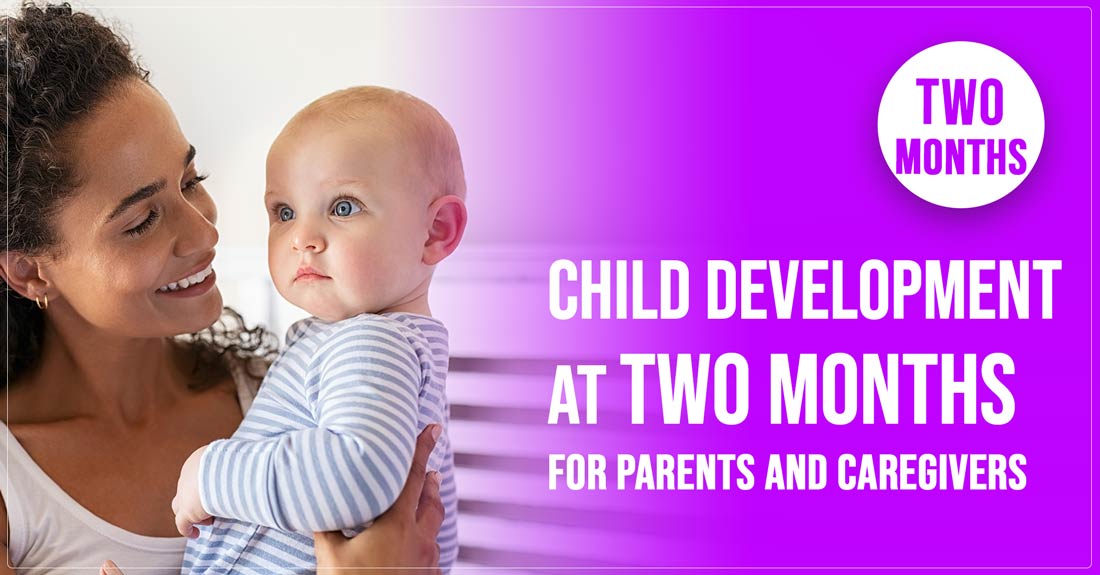Baby milestones and your 2-month old!
Get ready for exciting milestones with your 2-month old. Your baby’s personality will start to emerge at this stage. Below are some milestones that you can expect to see this month and some tips on how to support the growth of your baby.
Your baby is unique, and they may not develop in the same way or as quickly as other babies. This is entirely normal. Contact a healthcare provider or general pediatrics if you have any concerns about your baby’s progress and health.
2-MONTH OLD MILESTONES | FREE DOWNLOAD
Physical Development
Credible sources such as peer-reviewed studies say that children gain about 2 pounds in weight and 1.5 – 2 inches in length per month at this age. Their face will get rounder, and their arms and legs might start to develop fat rolls. Your baby’s head is disproportionately larger than the rest of their body (this will even out as your baby develops).
Daily Activity and Movement
Two-month-old babies are learning to communicate and express themselves. Your baby will display more variety of emotions such as happy, sad, distressed, and uncomfortable. They will start to experiment with their vocal cords and make more noises. They will smile more and create “happy sounds,” especially when talking to them. They will also start to reach for objects more often.
2-month-old babies typically cry less often than newborn babies, but it is also normal for them to cry just as much. They now seem to get more upset when you leave them alone and calm down more quickly when held or spoken to. They may even start to self-soothe by sucking on their fingers and hands.
Your baby may start sleeping for longer periods and possibly even through the night. This change in sleeping patterns is due to increased stomach capacity. They still need lots of sleep and may sleep around 14 to 17 hours a day. Hence, hours of sleep are critical for the health of the baby.
Motor Skills
A baby’s movements will seem smoother and more coordinated. They will begin to lift their chest off the ground while lying face down and push with their elbows. They seem to hold their head more steadily when seated or held by you. Your baby will start to explore their hands and fingers more often and hold objects more firmly and with more control.
Vision and Hearing
Your baby will follow objects more consistently and move their head from side to side. Baby’s eyes will seem to focus better now, but not objects more than 12 inches away. Their vision is also sharper, and they can see colors more clearly, favoring brightly colored objects.
Babies begin to differentiate between voices and prefer their parents’ voices at this age. They also start to understand and know the difference between angry and friendly sounds.

Feeding your 2-month old baby
You should continue to feed your baby whenever they are hungry, as it is essential for the baby’s growth. For example, a 2-month-old baby needs a lot of breast milk and food to support their fast growth and typically eat about 6-8 times a day. However, breastfed babies might need to eat more often.
Babies communicate that they are hungry by moving their hands to their mouth, flexing their arms and hands, making sucking motions, and whimpering. They also communicate that they are full by slowing down or stopping sucking and turning away and may even fall asleep.
Make sure to use safe feeding practices with your infant. Doctors advise against a technique called “bottle propping,” in which parents prop the baby’s bottle on an object for hands-free feeding. This practice in formula feeding can lead to health risks such as choking and ear infections.
Tracking diapers can give you clues about whether your baby is getting enough to eat. There is no ideal number of wet or poopy diapers, but the most important thing is to pay attention to changes. Less than six wet diapers in 24 hours can signify dehydration, especially if there is a significant drop in wet diapers accompanied by a dry mouth.
Baby’s Health
Checkups
At two months, your baby needs another checkup with the doctor. They will measure their weight, growth, and head circumference to track your baby’s development. Your doctor will compare your child to the average weight of babies of the same age. You can expect them to get a number of vaccines at two months after birth, including diphtheria, tetanus, acellular pertussis vaccine (DTaP), Haemophilus influenza type B vaccine (Hib), pneumonia conjugate vaccine (Prevnar), rotavirus vaccine, and polio vaccine (IPV). During this visit, you should ask the doctor any questions you have about your baby’s health.
Diaper rash
If your baby wears dirty diapers for too long, they may develop a diaper rash. Change wet and soiled diapers as quickly as possible to avoid this. During changes, clean the diaper area with a gentle baby wipe.
Coughing
Coughing can be caused by a number of illnesses, including a cold, pneumonia, and whooping cough. If you notice your child is coughing, contact your baby’s doctor to make sure it is not anything serious. However, if the coughing coincides with fever or trouble breathing, immediately take your baby to a doctor.
FAQs – Frequently Asked Questions
What should I be doing with my 2-month-old for developmental milestones?
The following activities will help facilitate child development:
- Speech development: talk to your baby as much as possible. This helps them learn to communicate, and they will try to respond to noises.
- Reading: even if your baby does not understand everything, reading is a great way to bond with your baby and teach them about communication. They particularly enjoy books with bright colors and pictures.
- Taking them outside on walks
- Cuddles: Cuddling facilitates bonding and makes your baby feel safe and loved.
- Tummy time: one-month-old babies, tummy time is good for two-month-old baby development milestones. Practice it by placing your baby with their belly down on your chest or across your lap. This will help them practice lifting their head and strengthen their muscles. Do this 2-3 times a day for about 5-10 minutes at a time. Make sure you always watch your baby closely during tummy time.
When should I stop swaddling my baby?
According to the American Academy of Pediatrics, you should stop swaddling your baby between 2-4 months because they start to roll over at this stage. If your baby is swaddled when rolling over, your baby could be at risk of SIDS. SIDS is the leading cause of unpredicted death of unknown origin at this stage after birth. We want to take any and all precautions to protect from this. Talk to your healthcare provider to review other ways to prevent SIDS.
When will my baby start to sleep longer stretches?
Many babies will start to sleep for longer stretches at this time. Some babies won’t sleep for longer until after 4 months.

Dina is a wife, mother of 4, and adrenaline junky. She loves to share children’s health information from her professional and personal experience. More About Dr Dina.















